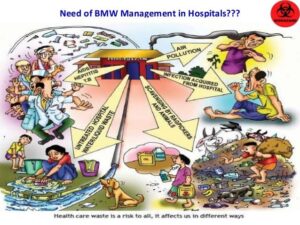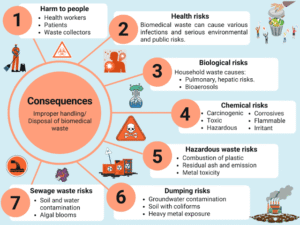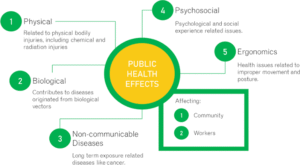Back to: Environmental Biology 100 Level
Welcome to class!
Hello bright learner! Today, we will discuss Waste Management & Public Health, a topic that directly affects our daily lives and well-being. Everywhere we go, we generate waste—whether it is food remains, plastic bottles, or used paper. How we handle this waste can either keep us healthy or lead to diseases. By the end of this lesson, you will understand what waste management is, why it matters, and how it is linked to public health.
Waste Management & Public Health
Imagine living in a community where rubbish piles up on the streets, drains are clogged, and flies are everywhere. Such an environment would not only look unpleasant but also be dangerous to our health. Waste that is not properly managed can lead to outbreaks of diseases like cholera and malaria. That’s why proper waste management is important for both the environment and public health.

What is Waste Management?
Waste management is the collection, treatment, recycling, and proper disposal of waste materials to reduce their harmful effects on people and the environment.
Types of Waste
Solid Waste: Includes household rubbish, plastics, and metals.
Liquid Waste: Includes dirty water from homes and industries.
Hazardous Waste: Waste from hospitals (like used syringes) and chemicals that can be dangerous.
Biodegradable Waste: Waste like food remains that can rot and return to the soil.

Non-Biodegradable Waste: Waste like plastics and glass that do not easily decompose.
Importance of Waste Management
Prevents the spread of diseases.
Protects water bodies from pollution.
Keeps our surroundings clean and attractive.
Helps recycle and reuse materials, saving money and resources.
Reduces harmful effects of toxic waste on the environment.
Public Health and Poor Waste Management
When waste is left unmanaged:
It becomes a breeding ground for mosquitoes, flies, and rats, spreading diseases like malaria, cholera, and typhoid.
Contaminated water from dirty drains can lead to outbreaks of diarrhoea.
Burning waste releases harmful smoke that causes respiratory problems.
Ways to Improve Waste Management
Sorting waste into biodegradable and non-biodegradable materials.

Recycling plastics, glass, and paper.
Community clean-up days and proper drainage maintenance.
Government-provided waste collection systems.
Public education on proper waste disposal.
Summary
- Waste management involves the collection, treatment, and proper disposal of waste.
- Types of waste include solid, liquid, hazardous, biodegradable, and non-biodegradable.
- Poor waste management spreads diseases and pollutes the environment.
- Effective waste management improves public health and keeps communities safe.
- Recycling, sorting waste, and community clean-ups are simple ways to manage waste.
Evaluation
- What is waste management?
- List three types of waste with examples.
- How does poor waste management affect public health?
- Mention three ways communities can manage waste effectively.
You have done so well today! Remember, keeping your environment clean is the first step to living a healthy life. Be proud of yourself for learning this, and keep shining with Afrilearn—you are the future of a cleaner and healthier Nigeria!
